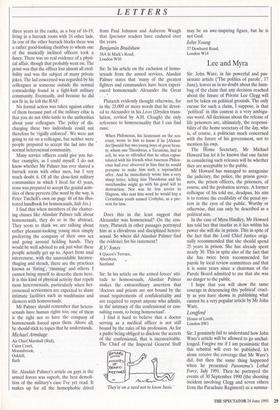Lee and Myra
Sir: John Ware, in his powerful and pas- sionate article (The politics of parole', 17 June), leaves us in no doubt about the hum- bug of the claim that any decision reached about the future of Private Lee Clegg will not be taken on political grounds. The only excuse for such a claim, I suppose, is that `political' in this context is a very ambigu- ous word. All decisions about the release of life prisoners are, ultimately, the responsi- bility of the home secretary of the day, who is, of course, a politician much concerned with the future of his government, not to mention his owp. The flame Secretary, Mr Michael Howard has let it be known that one factor in considering such releases will be whether they are acceptable to the public.
Mr Howard has managed to antagonise the judiciary, the police, the prison gover- nors, the prison officers, the prisoners, of course, and the probation service. A former colleague of his told me, deadpan, his aim is to restore the credibility of the penal sys- tem in the eyes of the public. Worthy or otherwise, that can only be described as a political aim.
In the case of Myra Hindley, Mr Howard has told her that insofar as it lies within his power she will die in prison. This in spite of the fact that the Lord Chief Justice origi- nally recommended that she should spend 25 years in prison. She has already spent nearly 30. This in spite also of the fact that she has. twice been recommended for parole by local review committees and that it is some years since a chairman of the Parole Board admitted to me that she was no danger to the public.
I hope that you will show the same courage in denouncing this 'political' cruel- ty as you have shown in publishing what cannot be a very popular article by Mr John Ware.
Longford
House of Lords, London SW1


























































 Previous page
Previous page